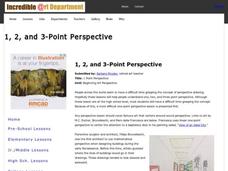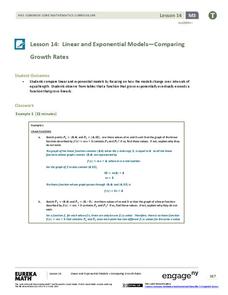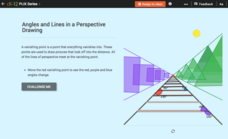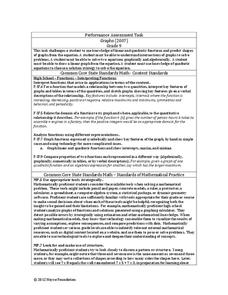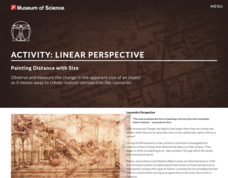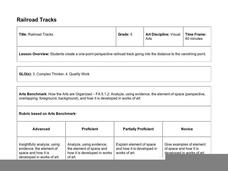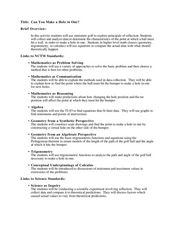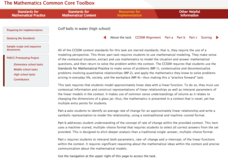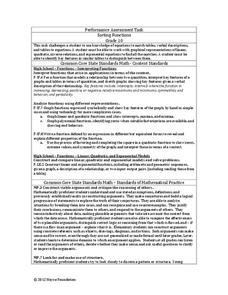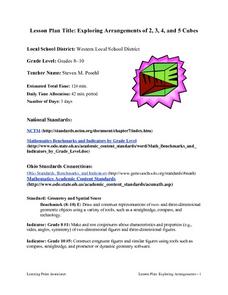National Gallery of Canada
Mastering One-Point Perspective
Cover one-point perspective through observation and practice. Class members examine several works of art that use one-point perspective, look at magazine images to find the vanishing points and horizon lines, and draw their own city...
Incredible Art
1, 2, and 3-Point Perspective
Introduce drawing students to perspective with a series of lesson that detail how to draft images in one-, two-, and three-point perspective. Each exercise includes step-by-step, illustrated directions and examples.
CK-12 Foundation
Families of Lines: Room in Perspective
Get a perspective of lines that share a point. The interactive displays a family of lines that share the same y-intercept. Individuals can find the equations of the lines by moving the line displayed and find what is common...
Curated OER
City Streets in One-Point Perspective
Students examine the basics of drawing forms in one-point perspective, and linear perspective. They transform their drawings into city scenes using one-point perspective.
EngageNY
Linear and Exponential Models—Comparing Growth Rates
Does a linear or exponential model fit the data better? Guide your class through an exploration to answer this question. Pupils create an exponential and linear model for a data set and draw conclusions, based on predictions and the...
Curated OER
Art Basics Scavenger Hunt
Hand out this worksheet and lead your class on a scavenger hunt. Pupils look for examples of shape, form, balance, pattern, perspective, space, and depth. They draw and write about the examples they've found. A great resource to add...
CK-12 Foundation
Linear Pairs: Angles and Lines in a Perspective Drawing
Gain some perspective on linear pairs. Aspiring mathematicians adjust the vanishing point on a perspective drawing. They see the effect on linear pairs of angles and answer five challenge questions based on their observations.
Inside Mathematics
Graphs (2007)
Challenge the class to utilize their knowledge of linear and quadratic functions to determine the intersection of the parent quadratic graph and linear proportional graphs. Using the pattern for the solutions, individuals develop a...
Curated OER
Fantasy Buildings in Two-point Perspective
Fifth graders learn the basics of drawing forms in two-point perspective. They can then transform their drawings into a fantasy building.
Museum of Science
Linear Perspective: Painting Distance with Size
Young scholars examine a simple set up to measure the change in the apparent size of an object as it moves away from them.
West Contra Costa Unified School District
Solving Inequalities
What does translating points on a number line have to do with solving inequalities? Young mathematicians first learn about translations of points on a number line, and then use this information to solve linear inequalities in one variable.
Inside Mathematics
Conference Tables
Pupils analyze a pattern of conference tables to determine the number of tables needed and the number of people that can be seated for a given size. Individuals develop general formulas for the two growing number patterns and...
Hawaiʻi State Department of Education
Railroad Tracks
Ahhh the vanishing point! Sounds ominous, but it's not. Fifth graders analyze the use of perspective in Renaissance art. They practice using linear perspective to draw railroad tracks that seem to go on forever. Tip: Make this...
Curated OER
Can You Make a Hole in One?
Students relate miniature golf to reflection of an image. In this algebra lesson, students collect and graph data as they study linear equations. They apply properties of graphing to solve real life scenarios.
Inside Mathematics
Squares and Circles
It's all about lines when going around. Pupils graph the relationship between the length of a side of a square and its perimeter. Class members explain the origin in context of the side length and perimeter. They compare the graph to the...
Inside Mathematics
Graphs (2006)
When told to describe a line, do your pupils list its color, length, and which side is high or low? Use a activity that engages scholars to properly label line graphs. It then requests two applied reasoning answers.
Inside Mathematics
Population
Population density, it is not all that it is plotted to be. Pupils analyze a scatter plot of population versus area for some of the states in the US. The class members respond to eight questions about the graph, specific points and...
Inside Mathematics
Snakes
Get a line on the snakes. The assessment task requires the class to determine the species of unknown snakes based upon collected data. Individuals analyze two scatter plots and determine the most likely species for five...
Mathematics Common Core Toolbox
Golf Balls in Water
Here's a resource that models rising water levels with a linear function. The task contains three parts about the level of water in a cylinder in relationship to the number of golf balls placed in it. Class members analyze the data and...
EngageNY
Complex Numbers and Transformations
Your learners combine their knowledge of real and imaginary numbers and matrices in an activity containing thirty lessons, two assessments (mid-module and end module), and their corresponding rubrics. Centered on complex numbers and...
Inside Mathematics
Sorting Functions
Graph A goes with equation C, but table B. The short assessment task requires class members to match graphs with their corresponding tables, equations, and verbalized rules. Pupils then provide explanations on the process they used to...
Curated OER
Getting Perspective In The Renaissance
Students engage in a lesson that is concerned with the art of photography. They conduct research using the Internet and other resources. The students use the lesson plan to create context for using analytical language for class discussion.
EngageNY
First-Person Computer Games
How do graphic designers project three-dimensional images onto two-dimensional spaces? Scholars connect their learning of matrix transformations to graphic design. They understand how to apply matrix transformations to make...
Curated OER
Exploring Arrangements of 2, 3, 4, and 5 Cubes
Students construct models of various tricubes, tetracubes, and pentacubes that are possible, classify n-cubes into different groupings, and draw these figures on isometric dot paper giving true perspective to what they visualize.



